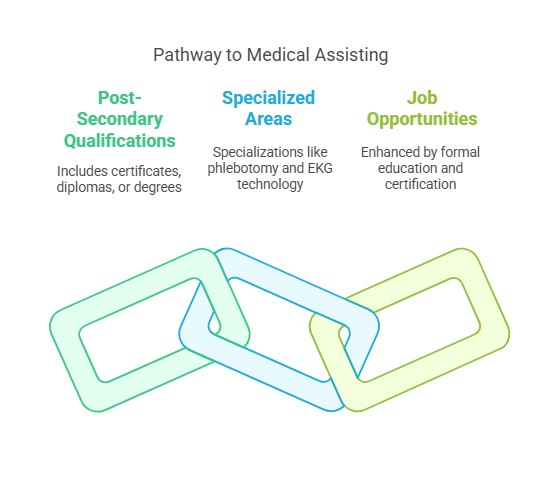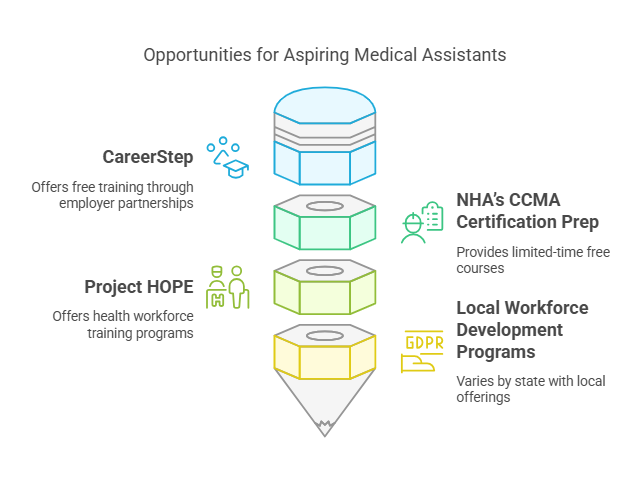Free Certified Medical Assistant Program Online
Medical assistants play a critical role in ensuring healthcare facilities run smoothly. They multitask between clinical and administrative duties, providing essential support to doctors and nurses while ensuring patients feel comfortable and receive the care they need.

With the growing demand for healthcare professionals, medical assistants are more crucial than ever. As healthcare facilities aim to provide seamless services, the role of medical assistants has evolved to include both patient care and behind-the-scenes administrative work.
Medical Assistant Job Description and Work Environment
Medical assistants typically work in hospitals, clinics, private practices, and long-term care facilities. Their responsibilities include scheduling appointments, maintaining patient records, handling medical billing and coding certification through AMBCI, and assisting with clinical tasks such as taking vital signs, preparing examination rooms, and administering medications under supervision.
They work in hygienic, well-lit healthcare settings and often wear protective gear, including gloves, masks, and scrubs. Most medical assistants work full-time, averaging 40 hours per week. Some positions may require evening, weekend, or holiday shifts, depending on the facility's needs.
Essential Skills and Qualifications
Most employers prefer candidates with post-secondary qualifications, such as a certificate, diploma, or associate degree in medical assisting. These programs typically cover medical office terminology, insurance billing, pharmacology, anatomy, and clinical procedures.
An associate degree is often more comprehensive, allowing medical assistants to specialize in areas like phlebotomy, EKG technology, or administrative healthcare management. Formal education and certification significantly enhance job opportunities, making it easier to secure stable employment and advance in the field.

Benefits of Certification
Certification is highly recommended for medical assistants and is often required by employers. Earning credentials such as the Certified Clinical Medical Assistant (CCMA) or Certified Medical Administrative Assistant (CMAA) establishes credibility and demonstrates a commitment to professional standards.
Certified medical assistants generally have better job prospects, higher salaries, and more opportunities for advancement. Additionally, keeping up with industry updates and best practices is essential, as healthcare regulations and procedures frequently evolve.
Free Online Medical Assistant Training Programs
Free medical assistant training programs provide an excellent opportunity to gain valuable skills without the financial burden of tuition fees. Many online platforms, community colleges, and nonprofit organizations offer free or low-cost certification programs to help aspiring medical assistants enter the workforce.
Some organizations providing free medical assistant training in 2025 include:
CareerStep (partnered with employers to offer free training)
NHA’s CCMA Certification Prep (limited-time free courses)
Project HOPE’s Health Workforce Training Programs
Local Workforce Development Programs (varies by state)
These programs offer flexible learning options, allowing students to complete coursework online and gain hands-on experience through internships or externships.

Certified Clinical Medical Assistant (CCMA) Career Path
Medical assistants have multiple opportunities for career advancement. They can specialize in specific medical fields, such as dermatology, cardiology, or pediatrics. With experience, they may transition into roles such as medical office managers, health administrators, or even clinical supervisors.
Advanced certifications, such as Registered Medical Assistant (RMA) or Certified Phlebotomy Technician (CPT), can further enhance career prospects. Some medical assistants also choose to pursue nursing or other advanced healthcare roles.
Medical Assistant Salary and Job Outlook (2025 Update)
The earning potential of medical assistants depends on factors such as certification, experience, and location. As of 2025, the median annual salary for medical assistants in the U.S. is $39,000, with an average hourly wage of $18.75.
Medical assistants are in high demand, especially in outpatient clinics, private practices, and specialized healthcare facilities. The Bureau of Labor Statistics projects a 16% job growth in this field over the next decade, making it one of the fastest-growing healthcare careers.

Job Search Strategies for Medical Assistants
To stand out in the competitive job market, medical assistants should continue developing their skills and staying updated on industry trends. Key strategies include:
Obtaining additional certifications in specialized areas like EKG, phlebotomy, or patient care.
Attending workshops and professional conferences to stay updated on the latest medical advancements.
Joining professional associations such as the American Association of Medical Assistants (AAMA) or the National Healthcareer Association (NHA).
Networking with professionals through LinkedIn, medical forums, and mentorship programs.
These strategies can help medical assistants build a strong resume and secure better job opportunities.
Conclusion
Free medical assistant training programs provide an excellent gateway to a fulfilling healthcare career. Whether through online courses, in-person workshops, or employer-sponsored programs, aspiring medical assistants have numerous opportunities to gain skills and certification at little to no cost.
By obtaining certification, gaining hands-on experience, and staying updated with the latest medical trends, individuals can build a stable and rewarding career in the healthcare industry.
6 Lesser-Known Facts About Medical Assistants
Medical Assistants Can Specialize in Holistic and Alternative Medicine:
While specific government sources on medical assistants specializing in holistic medicine may be limited, the U.S. Bureau of Labor Statistics (BLS) provides information on medical assistant roles and where they may work.
U.S. Bureau of Labor Statistics - Medical Assistants
They Can Perform Basic Lab Tests:
Medical assistants perform basic laboratory tests in many healthcare settings, as noted in government publications on medical assistant duties.
MedlinePlus - Medical Assistant Job Overview
Some States Allow Medical Assistants to Administer Injections:
The American Association of Medical Assistants (AAMA) provides details on scope-of-practice laws for medical assistants, which can vary by state.
Medical Assistants Can Work in Legal Fields:
While not a primary focus of medical assistants, some work in medical-legal consulting. Relevant guidance on this could be found from the U.S. Department of Labor or in government job descriptions for medical legal consultants.
Robotics and AI Are Changing the Role:
The National Institutes of Health (NIH) has publications related to the use of robotics and AI in healthcare, which can impact the duties of medical assistants.
NIH - Artificial Intelligence in Healthcare
Medical Assistants Can Work in Cruise Ship Clinics:
The Centers for Disease Control and Prevention (CDC) discusses healthcare standards on cruise ships, which may involve healthcare professionals like medical assistants.
CDC - Cruise Ship Travel and Healthcare
Frequently Asked Questions (FAQs)
-
Not all free programs are accredited, so it's essential to verify whether the course meets certification requirements. Accredited programs usually partner with organizations like the NHA or AAMA.
-
Most free programs take 3 to 6 months to complete, but accelerated options can be finished in as little as 8 to 12 weeks, depending on the provider.
-
Some states allow uncertified medical assistants to work under supervision, but certification significantly improves job prospects and earning potential.
-
A Medical Assistant (MA) is a general term, while a Certified Clinical Medical Assistant (CCMA) has passed a formal exam and certification process, proving their expertise in clinical tasks.
-
Yes! Programs like Workforce Innovation and Opportunity Act (WIOA) grants, state workforce development grants, and Medicaid-funded training may offer free or subsidized medical assistant education.
